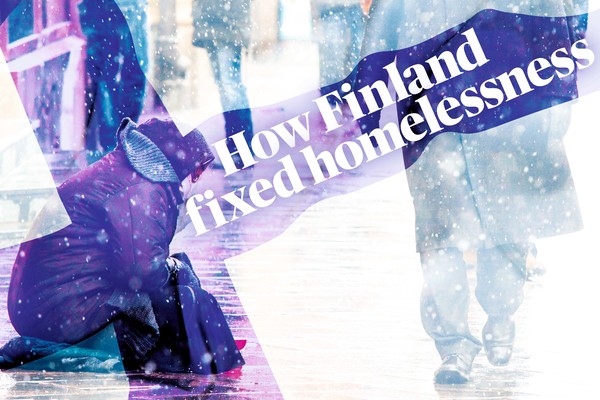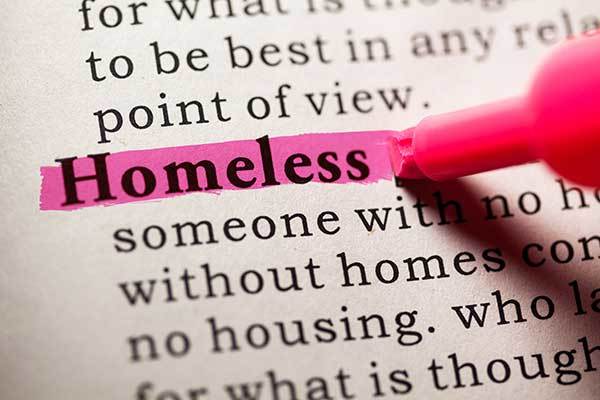You are viewing 1 of your 1 free articles
Sign up to the commitment to refer on homelessness
More than 200 housing associations have pledged to notify councils of people at risk of homelessness. Sarah-Jane Gay explains more about this collaboration between associations and councils
In 2016 government approached the National Housing Federation about a potential ‘housing association offer’ around the duty to refer – a part of the Homelessness Reduction Act that places a duty on some public bodies to refer an individual or household to a local authority if they are homeless or threatened with homelessness.
With homelessness soaring in recent years, we, along with our members, were keen to formalise our support, and do everything we could to tackle this desperate situation.
We spoke to housing associations from all over the country that said they wanted to show their commitment to the act. Not an offer to refer, but a commitment to refer.
“The commitment encourages new levels of local collaboration in tackling homelessness”
Most housing associations already notify local authorities when someone is going through an eviction process.
However, the commitment takes this a step further – it formalises the process across the sector and encourages new levels of local collaboration in tackling homelessness.
Working closely with the Ministry of Housing, Communities and Local Government, the Local Government Association (LGA) and a dedicated group of housing associations, we developed guidance for the Commitment to Refer, and began collecting sign-ups. The response has been overwhelmingly positive.
More than 200 housing associations – representing over 1.5 million homes – have already signed up to the Commitment to Refer. And many more have pledged to do so once they have reviewed policy and procedures.
Local authorities need robust and effective partnerships to deliver their responsibilities set out in the act.
We have therefore been working with the LGA to run a series of regional events, focusing on strengthening the Commitment to Refer, and how local authorities and housing associations can best collaborate in their joint aim of ending homelessness.
These roadshows revealed a lot about the pressures of rising homelessness across the country, and the limited resources available. The lack of social housing, high costs in the private rented sector and cuts to welfare benefits have seen homelessness and rough sleeping skyrocket in every locality we visited.
While we face a long battle in getting government to help deliver the 90,000 new social homes we need a year, initiatives such as the commitment to refer offer other opportunities for tackling homelessness with the resources we already have.
Members who attended the roadshows told us examples of how making a referral had helped to sustain tenancies. For example, Network Homes spoke about working more closely with East Hertfordshire, agreeing with the council to notify early, particularly in the case of families in rent arrears.
They have found that working together with the council to support a household sometimes encouraged tenants to engage where otherwise they wouldn’t.
“Members told us examples of how making a referral had helped to sustain tenancies”
Local authorities also told us how the commitment had led to them strengthening relationships with local housing associations, which enabled both parties to better plan and deliver homelessness prevention support.
There are challenges, too. As housing associations can operate across multiple local authorities, working with – in some cases – hundreds of local referral processes can prove difficult. The cuts in funding to local authorities and the sparse funding attached to the Homelessness Reduction Act were also well recognised.
Operationally, issues such as consent and when to refer were raised and we will continue to develop our guidance to reflect these challenges.
The roadshows showed housing associations’ and local authorities’ appetite to keep working together to find solutions to the homelessness crisis.
“We should all also feel compelled to look at our own policies, to ensure we are doing all we can to bring homelessness to an end”
Of course the act and the commitment on its own will not end homelessness. We need much more social housing, a thorough assessment of the impact of welfare reform on homelessness, and increased access to support. We will continue to push for these things.
We should all also feel compelled to look at our own policies, to ensure we are doing all we can to bring homelessness to an end.
But today the NHF is proud to celebrate that more than 200 housing associations have signed up to the Commitment to Refer. It shows genuine cross-sector collaboration, working together to identify people in real need, and ensuring they get support as soon as possible.
If you are not yet signed up, email homelessness@housing.org.uk to take this important step with us.
Sarah-Jane Gay, external affairs manager at the National Housing Federation
What is the NHF commitment to refer?
- The Homelessness Reduction Act, which came into force in April 2018, confers a duty to refer on certain bodies providing public services. This means they need to notify a local authority if they come into contact with somebody they think may be homeless or at risk of becoming homeless.
- Housing associations are not included in the duty to refer under the act
- However, the National Housing Federation has urged its members to sign up to a voluntary commitment to refer people at risk of homelessness to councils
- More than 200 housing associations have signed up so far
At a glance: Homelessness Reduction Act 2017
The Homelessness Reduction Act 2017 came into force in England on 3 April 2018.
The key measures:
- An extension of the period ‘threatened with homelessness’ from 28 to 56 days – this means a person is treated as being threatened with homelessness if it is likely they will become homeless within 56 days
- A duty to prevent homelessness for all eligible applicants threatened with homelessness, regardless of priority need
- A duty to relieve homelessness for all eligible homeless applicants, regardless of priority need
- A duty to refer – public services will need to notify a local authority if they come into contact with someone they think may be homeless or at risk of becoming homeless
- A duty for councils to provide advisory services on homelessness, preventing homelessness and people’s rights free of charge
- A duty to access all applicants' cases and agree a personalised plan












